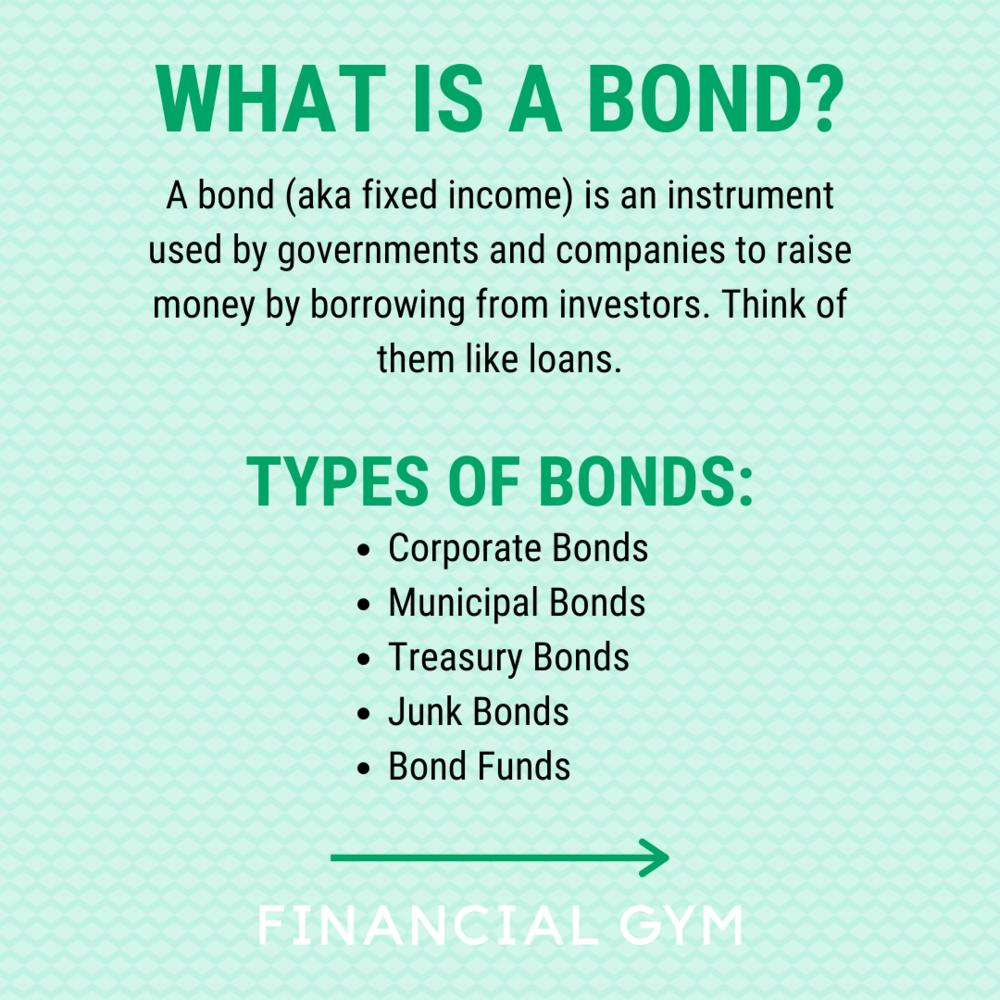Bonds: Types and How They Work
One question we have been asked frequently in light of the pandemic and the residual economic crisis is whether we recommend investing in bonds. Bonds are typically described as less volatile than a traditional stock investment, which make them a more stable choice and can play a key role in your investment strategy.
What is a bond?
A bond (aka fixed income) is an instrument used by governments and companies to raise money by borrowing from investors. Think of them like loans. They are typically issued by the government and companies to fund specific projects, rather than issuing actual shares in a company. Many of these bonds receive ratings that determine how sound of an investment they may be.
The two categories are investment grade and high yield. Their ratings are like a credit score, except for governments and companies. The better their rating, the lower interest you get paid and the less risk they pose. It’s just like when you have a good credit score: you get lower interest rates on your loans.
Types of Bonds
Corporate Bonds:
These are issued by a company to fund expansion projects, research, and development. The returns from corporate bonds are taxable, but they typically yield higher returns than government bonds, which offsets the taxes.
Municipal Bonds:
This type of bond is issued by a city or state to fund projects like schools, roads, and hospitals. These types of bonds have untaxed returns. There are two types of municipal bonds:
General Obligation: these bonds fund projects that don’t produce income, but rather add value to a community, such as a playground or park. The payments are guaranteed on these bonds in good faith and are often paid through an increase in taxes.
Revenue Bonds: these bonds are expected to create income, and they pay back investors with the income that they do create. An example of a revenue bond is a new highway. The revenue from the tolls on the new highway would become returns for the investors. The yield on a revenue bond is typically higher than on a general obligation bond.
Treasury Bonds:
These are bonds issued by the U.S. government. They are considered risk-free. Because of the low-risk, they do not yield high returns and any income is taxed by the Federal government.
Junk Bonds:
These are simply low-rated corporate bonds. They may offer higher returns, but that higher return comes with higher risk.
Bond funds:
These are essentially mutual funds of bonds. This is a group of bonds that is held under one fund. This way you are investing into a portfolio of bonds, rather than selecting just one specific bond. Bond funds can also contain multiple types of bonds (corporate, municipal, and Treasury). The benefit of a bond fund is that it minimizes risk. By investing in multiple bonds, there is a higher chance of greater return. On the flipside, these bonds are professionally managed, so you likely will have to pay a management fee.
How do you know if investing in a bond is right for you?
How long are you looking to commit for? It’s important to check the term of the bond before purchasing. Some may be 5 years or 10 years, or even more. If you anticipate needing the money before the bond term is up, then it is not smart to purchase the bonds.
How much risk can you take on based on your goals? Be sure to check the bond’s rating before going ahead with a purchase. The bond’s rating will let you know how creditworthy the bond is. AAA is the highest rating a bond can have, whereas below C is considered a junk bond.
High ratings = More stable, but lower earning potential
Low ratings = Higher risk, but potential for higher reward
What are the benefits of investing in bonds?
Bonds tend to promise return. Unless you are investing in a junk bond or the inflation rate is particularly high, you will typically receive a return when you purchase a bond. Now, this is NOT to say that every bond delivers returns, or that the returns will be high, but investing in bonds is considered a relatively safe investment.
Bonds can help you diversify your portfolio. Whether you are new to investing or not, it is important to have a diverse portfolio-- this includes investments in both stocks and bonds.
Municipal bonds are a way to directly invest into your community. They may not provide high returns, but you are giving back and likely helping provide a resource that will improve the value of life for individuals in the community.
Are there risks associated with investing in bonds?
Of course, as with any investment, there are always risks. If interest rates increase, the value of the bond decreases. Similarly, if the inflation rate rises faster than the value of the goods that you are providing, it can outpace the bond and therefore the bond may lose value. Bonds do not earn value until they are at term, whereas stocks can be sold at any time.
Ready to take your finances to the next level?
To get started, schedule a free 20-minute consultation call to speak to a member of our team. We will ask you a few basic questions to get to know you more, walk you through our financial training program steps, and answer any questions you may have. No pressure to join! Need advice quickly? Talk to one of our Trainers on Demand.

